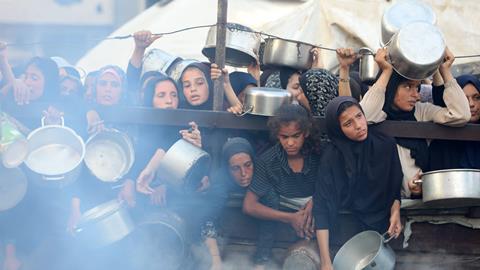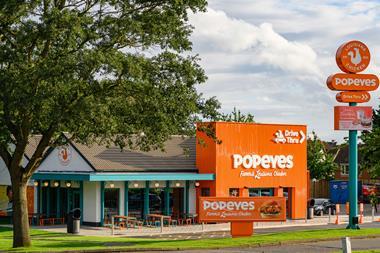Last Thursday’s intervention by over 150 senior food sector executives over the worsening humanitarian crisis in Gaza marks a significant development in the discourse around the conflict between Israel and Hamas.
The letter said Keir Starmer’s warning to Israel that the British government would officially recognise a Palestinian state in September – unless it agreed to a ceasefire and “a long-term, sustainable peace” – did not go far enough.
In the face of almost 60,000 civilian deaths, including 18,000 children, and amid “systematic starvation”, it urged the PM to push for the reopening of all land borders into Gaza “without delay”, while also restoring food and aid flows into the territory.
But the publication of the letter to end Gaza’s “man -made famine”, which has already generated huge interest within the food industry, also raises the question: Why has it taken so long for UK grocery to break its silence?
Until this intervention, engagement from the industry on this key issue has been muted at best – with Co-op’s boycott of Israeli goods in June (which itself was part of a wider supply cull from 17 “countries of concern”, rather than a direct criticism of Israel’s actions in Gaza), being the only other move of note on the crisis.
Time to speak out
Tempeh brand Better Nature’s founder Elin Roberts admitted as much in a LinkedIn post last week, when she said she had “protested, donated, boycotted, spoken to friends and family and petitioned” on what are rapidly developing into famine-like conditions in the territory.
But she had “not brought it here [to the usually opinion and debate-heavy pages of LinkedIn]” until a campaign for supporters for the letter had been launched by Pip & Nut’s founder Pip Murray last week.
A fear of speaking out due to the political complexity of the situation (but also the potential cost and damage to the business prospects of their businesses) has clearly been a major driver on this issue for the many food businesses who have either signed the letter, or those who support its messaging – but have so far decided to keep their counsel.
As one of the letter’s signatories told The Grocer, this is a “hugely complex issue, it’s definitely not black or white and it’s been hard to find the right nuance – but for me, the mass starvation of people in Gaza made it too important not to speak out”.
It’s “a real battle in terms of speaking out”, they add, while citing the “safety of numbers” from the sheer volume of businesses to have now voiced their concerns over the crisis.
They also said there was a consideration of where to draw the line: “If I comment on this, what about all the other injustices in the world?”
‘Stay out of politics’
Indeed while there are many supporters of the call for further pressure on the Israeli state, there are, quite understandably, voices of dissent too.
Speaking in the wake of Co-op’s boycott, the Campaign Against Antisemitism said such actions “have real-world effects on the Jewish community”, with 84% of British Jews in a recent poll saying boycotts of Israeli businesses constitute intimidation.
On that topic, Grocer journalists have been sent abusive messages for even flagging the issue over the past week. Meanwhile, a commenter on our original story on Thursday echoed the “stay out of politics and stick to football” criticism levelled at footballer Marcus Rashford for his 2021 anti-child poverty campaign – suggesting once again that food companies should “stay in lane, keep out of the politics. You are not there to support the personal views of Pippa Murray.”
It’s also interesting to note that all other major supermarkets, and even industry associations such as the FDF and BRC, have remained silent on this topic, despite the publicity surrounding last week’s letter.
That wider silence from the industry is in stark contrast to the many column inches of commentary from the wider food sector on issues such as food poverty, obesity and even political issues such as National Insurance hikes, or the impact of government changes to Inheritance Tax for farming businesses – even support for Ukraine since the start of its war with Russia.
To add to the complexity around Gaza, it’s also important to note that Hamas – whose murderous attacks on Israel on 7 October 2023 heralded the start of the conflict – is yet to return 50 Israeli hostages, let alone agree to a ceasefire or surrender. And despite what now amounts to significant diplomatic pressure, there appears to be no end in sight to the conflict, the roots of which stretch back over a century.
But, despite all these factors, and given the huge engagement The Grocer has seen around the open letter, this issue is clearly troubling a significant proportion of the food sector.
“When you work in a food business, you can’t look away from what’s happening in Gaza,” Murray said last week. “This is not a political issue – it’s a moral one. Every day that passes without decisive action is another day a child could die from hunger.”
The food industry has always acted to find solutions to feed hungry mouths if it possibly can. Why should this situation be any different?




















No comments yet